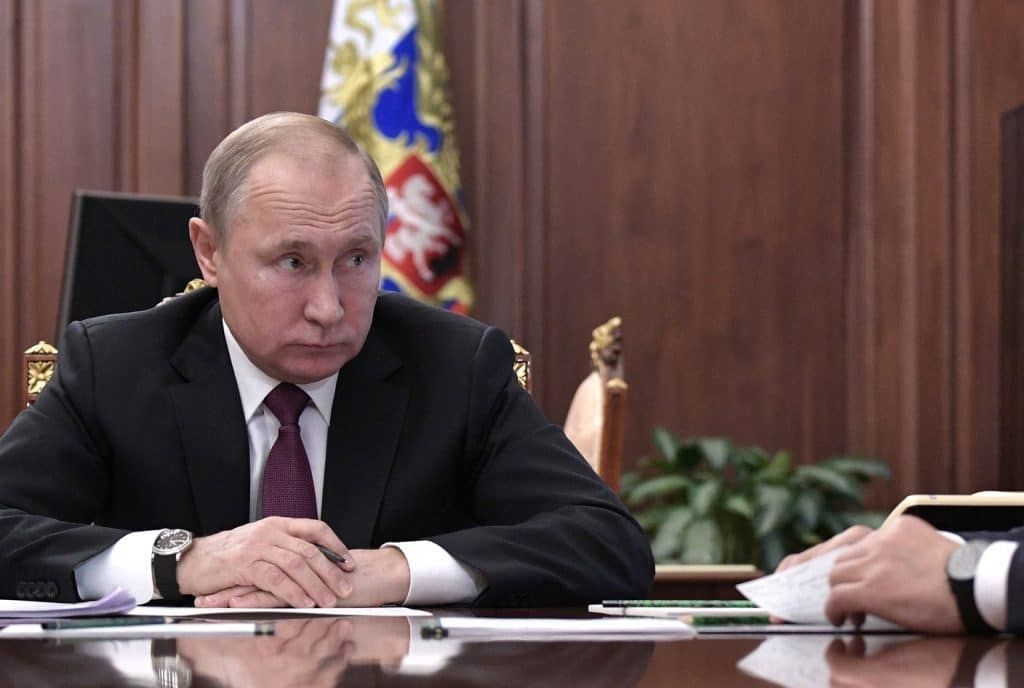Russia killed arms control. Why does it want to keep New START?
By Kristin Ven Bruusgaard | February 5, 2020
 Vladimir Putin in 2019. Photo credit: Kremlin.
Vladimir Putin in 2019. Photo credit: Kremlin.
Russia is a key protagonist in the tale of the demise of the Cold War arms control architecture. After all, it’s Russia that bears most of the responsibility for the recent collapse of the Intermediate-Range Nuclear Forces (INF) Treaty. It seems a little strange, then, that Moscow now seems so keen to salvage New START, the final remaining bilateral arms control treaty between the world’s two nuclear superpowers.
The Russian position seems even more paradoxical because there is mounting evidence that Russia no longer values arms control as a means for producing security. One need look no further than the rapid modernization of the Russian nuclear arsenal, or the introduction of a range of new and unprecedented strategic and sub-strategic systems, including a nuclear-powered cruise missile, a nuclear-armed torpedo, and a nuclear-capable hypersonic missile system. Its blatant and sustained disregard for other treaties and obligations, such as the Helsinki document, the Budapest memorandum, and the Conventional Forces in Europe Treaty, reinforces the impression that Russia has abandoned arms control as a foreign policy tool.
Even Russia’s interest in New START was not always unqualified. As recently as December 2018, Russian willingness to prolong the treaty was conditional on the United States fulfilling certain obligations. After the death of the INF Treaty, though, Russia has been singing a different tune, with both President Vladimir Putin and Foreign Minister Sergei Lavrov repeatedly reiterating that Russia is ready to extend the treaty without preconditions.
All of this has led some to wonder whether Russia’s newfound desire to extend New START is feigned. It is not, and there are at least three reasons why Moscow genuinely wants to keep the treaty in place.
First, a world without arms control is a world where Russia’s claim to great power fame is diminished. It is a world in which Russia no longer has a special relationship with the United States. To be sure, that relationship has not seemed so special for a while, mired as it is by political scandal and mutual accusations of meddling in internal politics. (Yes, the Russians also accuse the United States of meddling in internal affairs to produce regime change in Russia.) Still, the Russians express an interest in preserving what was, at least, a common understanding of the special responsibility of the world’s two largest nuclear powers. China’s power status might be rising, but not in this domain. A world in which the two powers with the nuclear capability to annihilate each other (and the world) do not talk increases the risks of nuclear confrontation.
Second, a world without arms control reduces strategic stability. These days, Russia and the United States can no longer agree on holding talks about “strategic stability,” as the United States now insists on calling them “strategic security” talks. This small disagreement illustrates that mutual legibility between the two nuclear superpowers is already severely diminished. Still, maintaining an agreement to limit numbers preserves some element of strategic stability and predictability as compared to the alternative.
A world without New START deprives both Russia and the United States of key mechanisms of transparency and verification regarding the nuclear arsenals of the other. Gen. John Hyten of US Strategic Command said that the value of this information is irreplaceable, including for the intelligence community. It is likely that the national technical means, such as satellite photography, of the United States are superior in this domain, making the value of verification mechanisms even greater for Russia. Such information produces greater certainty in peacetime estimates and reduces uncertainty about adversary capabilities in wartime, reducing concerns about first strike incentives in times of crisis.
Finally, a world without arms control produces more intense arms racing, which Moscow can hardly afford. Some experts contest this, arguing that Russia is favorably positioned for strategic competition with the United States. Russian strategic modernization is well under way, and several new and exotic systems are coming online. Meanwhile, US strategic modernization is only just beginning and promises less revolutionary change. Russia could thus increase its strategic nuclear arsenals more rapidly than could the United States. Some of the new Russian systems could allegedly serve to “outflank” the United States in a new arms race.
But Russia’s new systems seem to be mostly about ensuring Russia does not lose its retaliatory capability to a combination of US counterforce and missile defense. Ever since the United States withdrew from the Anti-Ballistic Missile treaty in 2002, Russia has been living in a world without limitations on defensive systems. They have invested vast resources in “weapons based on new physical principles,” such as hypersonic and electromagnetic pulse weapons to overcome what they perceive as a challenge to their secure retaliatory capability. Ultimately, Russian and US decisions regarding arsenal size in a world without limitations will be closely interwoven. The numbers of deployed warheads will increase if doing so is necessary to overcome adversary defensive or offensive systems.
Although Russia may be able to compete with the United States in the short term, its long-term competitive prospects are dim. The Russian lead in some domains such as hypersonic missiles does not mean they expect to stay ahead. Russia still has severe concerns about their sustained conventional lag and about the US ambition to develop conventional hypersonic weapons. The jury is still out on who will have the edge in emerging technologies such as artificial intelligence, but most bets are that it will not be the Russians. In the long term, there is no way Russia will out-compete the Americans (or the Chinese for that matter) strategically. In addition, the Russians have been down this road before. The last attempt to outspend an adversary led to the collapse of the Soviet Union, which Putin himself called “the greatest geopolitical catastrophe of the century—a real drama for the Russian people.” Russian leaders would probably not willingly choose to go down that same path again.
The strong do what they can; the weak suffer what they must. Russia does not perceive of itself as weak, with a military-industrial potential that makes it capable of bringing online new capabilities to offset key shortcomings. At the same time, Russia is vulnerable. Its sustained reliance on nuclear weapons demonstrates an inability to compete and an expectation to remain behind in the conventional military domain. This means a constant concern for how non-nuclear and emerging capabilities will affect the country’s nuclear retaliatory capability.
The preservation of New START and arms control is one way for Russia to remain in the great power game. The total dissolution of bilateral arms control, on the other hand, will deprive Russia of the only area in which it remains a peer competitor with the United States. It will increase the potential for nuclear war and potentially force Russia toward the already-familiar path of arming themselves to bust. None of these contingencies will sustain Russia’s strategic goal of remaining a great power contender for the future.
Together, we make the world safer.
The Bulletin elevates expert voices above the noise. But as an independent nonprofit organization, our operations depend on the support of readers like you. Help us continue to deliver quality journalism that holds leaders accountable. Your support of our work at any level is important. In return, we promise our coverage will be understandable, influential, vigilant, solution-oriented, and fair-minded. Together we can make a difference.
Keywords: New START, Russia, United States, arms control
Topics: Analysis, Nuclear Weapons
















Russia’s ability to wipe the US off the map will remain in place with or without New Start. Gorbachev willingly ended the Soviet system because it had been a failure for so long, not because of “arms control”. In many ways, the Russians are in a much stronger position than the USSR ever was.